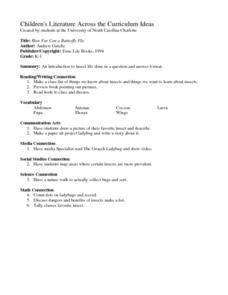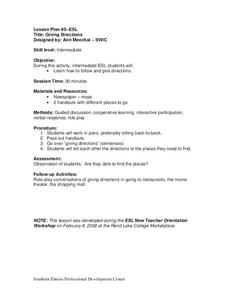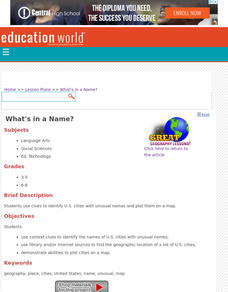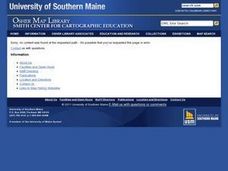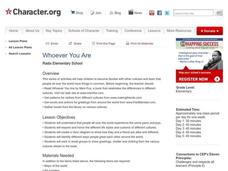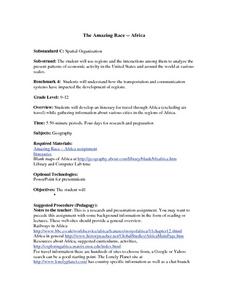Curated OER
How Far Can a Butterfly Fly
Students draw a picture of their favorite insect and describe. Students make a paper art project ladybug and write a story about it. Students map areas where certain insects are more prevalent. Students count dots on ladybugs and record.
Curated OER
Giving Directions
While incomplete, this lesson provides an interesting way to approach an activity on giving and following directions. Learners work in groups, using a newspaper and maps, to give each other directions to a specific location. The handouts...
Curated OER
What's In a Name?
Students examine the origins of the names of U.S. states, focusing on names that were derived from Native American words. They are provided with lists of the names of the 50 states, and then research online or in library resources the...
Curated OER
Charting Neptune's Realm: Profiles
Students identify and describe the importance of nautical profiles in early navigation. They draw a profile of a street or mall and explore the effectiveness of different types of directions.
Curated OER
Latitude
Students examine the theory of finding latitude and discuss the uses of an astrolabe, cross-staff and octant. They determine an Astronomical Table for their classroom.
Curated OER
Endangered Animals Books
Middle schoolers research endangered species and create and publish books to present their findings. Designed to use Inspiration software, this resource could be adapted if you don't have access to the program. Contains handy website...
Curated OER
Where it Grows
First graders identify the commodities of Oregon and produce a map of the different commodities in different regions.
Curated OER
The Sweet Connection
Students use maps to find what crops are dominant in areas where honey bees are raised and discuss possible correlations. They mark the top ten honey- producing states on a US map.
Curated OER
Creating a Wild Family Album
Third graders choose an animal to research and create a portfolio about that animal that includes information from at least three resources, a graphic organizer, maps, food webs, and captioned pictures.
Curated OER
Interviews with the American People "Days of Infamy"
Students compare and contrast statements made by people in "Man on the Streets." They are interviewing them on the current war in Iraq and how they felt on Sept. 11th. These interviews are tape recorded. To see what kinds of questions to...
Curated OER
This Land Is Our Land
Students research federal land holdings. They explore how those lands are used. They map these lands and design their own legends. They discuss whether or not the land is being used accordingly.
Curated OER
The African Slave Trade: From West Africa to South Carolina and Beyond
Eighth graders explore the African slave trade. They identify the principal figures practicing the African slave trades at three locations. Students draw the physical routes of the slave trade on a map and they list the reasons for the...
Curated OER
Agriculture in Canada
Students examine various elements in the physical environment and their relationship to agriculture in Canada. Using the ArcCanada CD-ROM, they analyze maps, and interpret relationships between the physical environment and land use.
Curated OER
Sybil Ludington's Ride - a poem
Fourth graders examine the role a teen from the Hudson Valley played in the American Revolution. They view the map of Sybil's ride and calculate the distance using the map's legend.
Curated OER
Whoever You Are
Students examine cultures, traditions, and feeling throughout cultures. In this cultural instructional activity, students use literature, maps, and cultural information to examine how people have universal feelings despite their...
Curated OER
A Book Is A Window To the World
Second graders listen to pieces of literature that take place in different regions of the world. Using a map, they identify and locate the continents and oceans mentioned in the story. They describe the physical and human characteristics...
Curated OER
The Amazing Race -- Africa
High schoolers conduct research and gather information regarding various cities in Africa. They discover what it would take to travel to and through Africa and plan a trip through various regions of the continent. They present their...
Curated OER
Where Do Animals Come From?
Learners use library search engines to research an animal and its origin. In this animal research lesson plan, students research their assigned animal using ProQuest. Learners then find the country of origin of the animal using a library...
Curated OER
Site and Situation: Right Place at the Right Time
Learners analyze geographic details. In this research skills lesson, students research maps as well as primary and secondary sources to analyze growth, population, and manufacturing in Altoona, Pennsylvania following World...
Curated OER
Designing and Creating Earth Science Lessons with Google Earth
Everything from adding an overlay to uploading images to navigating the software, teachers become apt at using Google Earth™ in the classroom to create Earth Science lessons.
Curated OER
Where Did Foods Originate? (Foods of the New World and Old World)
What do papayas, peanuts, pineapples, and potatoes have in common? Why, they are foods explorers brought back to the Old World. Young researchers use the Internet to investigate how New World explorers helped change the Old World's diet....
Curated OER
Finding Your Spot in the World
Young scholars learn the concept of movement by locating their house and the houses of their ancestors.
Curated OER
Treasure Hunters
High schoolers design an on campus treasure hunt to find various architectural vocabulary words which they then create definitions for on the blog page on the Environmental Design website.
Curated OER
Finding Your Spot in the World
Students investigate a world map, a United States map, a state map, a county map and a city map. They locate each student's house on the city map and put a length of yarn from their house to a country of one of their ancestors.
